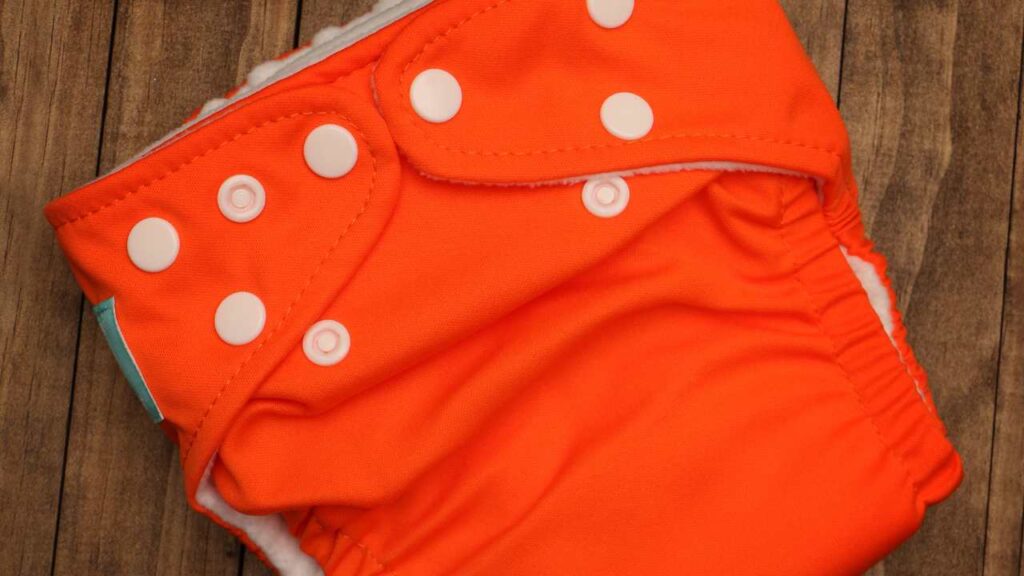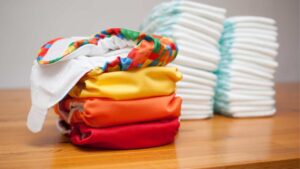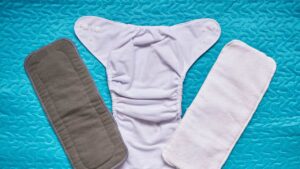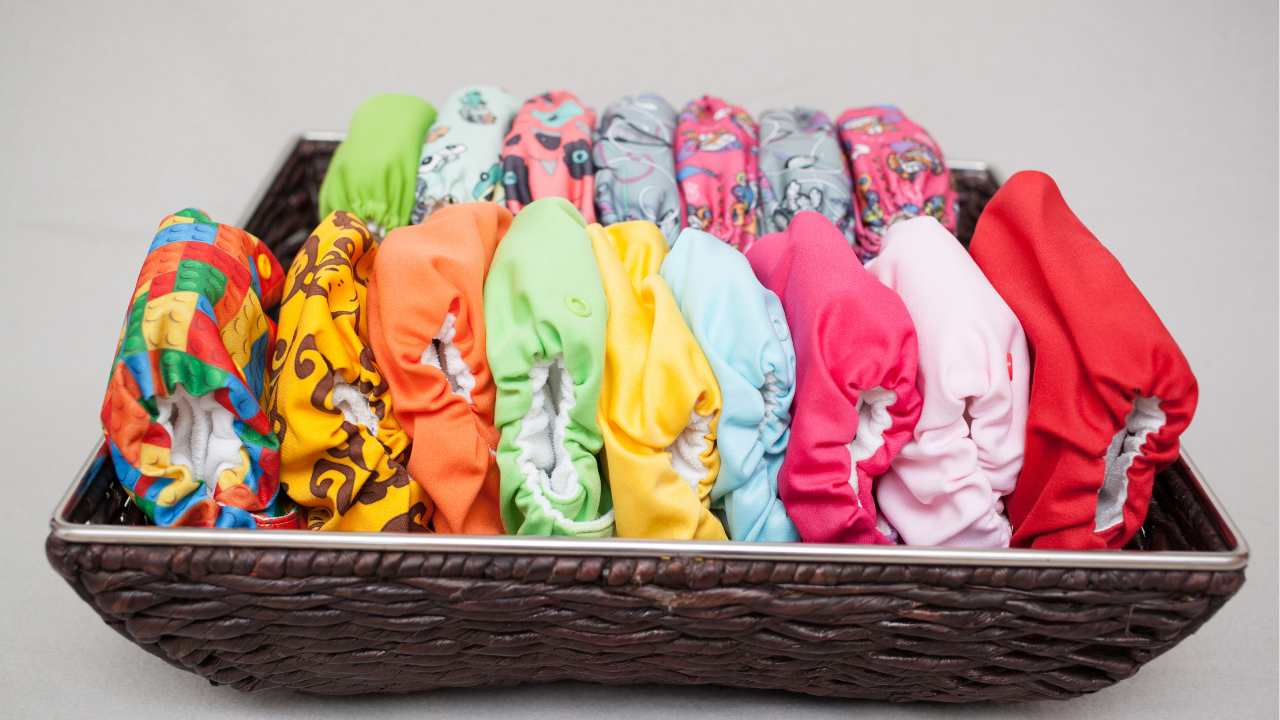What are the Benefits of Cloth Diapers?
Cloth diapers offer cost savings and environmental benefits. They are reusable, reducing waste compared to disposable diapers.
Embracing cloth diapers can be a game-changer for both your wallet and the planet.
Not only do they provide significant cost-efficiency over time, but they also lessen the staggering environmental impact caused by disposable diapers.
Their reusability ensures that parents can minimize recurring expenses while contributing to waste reduction.
Cloth diapers have evolved over the years, now boasting a variety of styles and materials that offer exceptional comfort and convenience.
They also decrease the exposure of a baby’s sensitive skin to the chemicals often found in disposables, potentially reducing diaper rash incidents.
The modern cloth diaper is designed to be user-friendly, often as easy to use as its disposable counterpart, making the switch a hassle-free experience for families.
With the surge in eco-conscious living, cloth diapers are becoming an increasingly popular choice for new parents who prioritize sustainability and health.
Eco-friendly Choice

Making the switch to cloth diapers is more than a cost-saving move. It’s a step towards a greener planet.
Cloth diapers offer a significant eco-friendly advantage over disposable ones.
Here we explore how cloth diapers can help nurture the environment for future generations.
Reduced Environmental Impact
Disposable diapers pile up in landfills, taking up to 500 years to decompose.
Cloth diapers reduce this burden significantly.
By reusing cloth diapers, parents minimize waste and conserve resources.
This simple choice leads to fewer diapers in landfills.
It makes a lasting difference on earth’s health.
- Lower carbon footprint by decreasing production and disposal needs
- Conserves water and energy by eliminating the constant manufacturing of disposables
- Minimizes hazardous waste, as cloth diapers don’t contain gels and chemicals found in disposables
Biodegradable Material Usage
Cloth diapers are often made from natural, biodegradable materials.
These materials break down easily compared to the plastics in disposable diapers.
Parents who choose cloth diapers not only ensure a gentler touch on their baby’s skin but also endorse a cycle that aligns with nature’s rhythm.
| Cloth Diaper Material | Biodegradability |
|---|---|
| Cotton | Yes, decomposes within 5 months |
| Bamboo | Yes, decomposes faster than cotton |
| Hemp | Yes, breaks down easily when composted |
With these options, cloth diapers don’t linger on the planet.
Instead, they return to the earth, feeding the soil for the next generation of plants and life.
It’s a full circle, from the cradle to the cradle.
Gentle On Baby’s Skin

Choosing the right diaper is crucial for your baby’s comfort.
Cloth diapers have gained popularity, primarily for being exceptionally gentle on delicate infant skin.
Let’s explore how cloth diapers stand out in providing a soothing embrace for your little one.
Natural Fibers
The core advantage of cloth diapers is their natural fiber composition.
Often made from materials such as cotton, bamboo, or hemp, these fibers promote airflow and are incredibly soft against the skin.
The breathability of cloth diapers ensures a pleasant environment reducing the risk of diaper rashes.
Here are their main benefits:
- Hypoallergenic – suitable for all skin types.
- Increased breathability – keeps moisture away from the skin.
- Comfortable feels – prevents irritation from rough materials.
Less Chemical Exposure
Unlike many disposable diapers, cloth diapers come with a minimal chemical footprint.
This means they lack the harsh substances that could trigger allergies or rashes on your baby’s skin.
With cloth diapers, your child experiences:
- Decreased risk of diaper rash – due to fewer chemicals.
- No exposure to dioxins – a group of chemically-related compounds often found in disposables.
- Fragrance-free comfort – avoids synthetic smells that might irritate sensitive skin.
Cost Savings In The Long Run
Parents seeking to trim the family budget often overlook the potential savings in choosing cloth diapers.
This section explores how cloth diapers not only benefit the environment but also your wallet over time.
Comparison With Disposable Diapers
Let’s examine the cost differences between cloth and disposable diapers.
- Initial Investment: Cloth diapers require a higher upfront cost.
- Recurring Cost: Disposables are a constant expense.
- Total Diapers Needed: A baby needs far fewer cloth diapers over time.
In comparison, disposables may seem cheaper at first glance but cost more due to frequent purchasing.
Reuse And Savings Over Time
Long-term savings with cloth diapers become evident when assessing reuse and life span.
| Aspect | Cloth Diapers | Disposable Diapers |
|---|---|---|
| Lifespan | Can be used for years | Single-use |
| Cost Over 2 Years | Stays the same | Increases |
| Multiple Children | Can be reused | Need to buy new |
Wash and reuse becomes the mantra for cloth diapers.
This practice unlocks incredible savings as the diapers serve multiple children.

Parents can also sell or donate cloth diapers once outgrown, further recouping their investment.
Cloth diapers stand as a frugal choice in the long run for every family.
Effective For Potty Training
Parents often seek the best strategies for potty training their toddlers.
Cloth diapers emerge as an unexpected but effective ally in this developmental milestone.
Unlike disposables, cloth diapers can lead to quicker potty training for several compelling reasons.
Sense Of Wetness
Cloth diapers excel in letting children experience the sensation of wetness.
This discomfort encourages them to recognize the need for a diaper change.
In contrast, disposable diapers are too good at wicking away moisture, sometimes hindering the potty training process.
Youngsters become aware of their bodily functions faster with cloth diapers, which can simplify the transition to underwear.
Encouraging Earlier Training
Studies suggest that children who wear cloth diapers may begin potty training at an earlier age.
The natural fabric in cloth diapers, as opposed to the super-absorbent chemicals in disposables, can be less comfortable when wet.
This discomfort may motivate a child to start using the potty sooner.
With this early start, the overall potty training period might also be reduced.
| Diaper Type | Sensation | Impact on Potty Training |
|---|---|---|
| Cloth Diapers | Wetness felt | Earlier training |
| Disposable Diapers | Less sensation due to absorbency | Potential delay in training |
- Earlier potty training may lead to less diaper use overall.
- Less diaper use results in cost savings and eco-friendly advantages.
Customizable Fit And Style
Switching to cloth diapers comes with an array of delightful perks, specifically the joy of customizable fit and style.

Unlike one-size-fits-all solutions of traditional disposable diapers, cloth diapers offer a plethora of options catering to every baby’s unique shape and comfort.
Let’s delve into the benefits of cloth diaper customization:
Variety Of Sizes And Designs
- Diverse range of sizes to fit newborns to toddlers.
- Choose from vivid colors and fun patterns for every personality.
- Eco-chic styles for the fashion-conscious parent and baby.
- Materials range from organic cotton to soft fleece, suiting skin sensitivities.
Babies grow quickly, but with cloth diapers, the right fit is always available.
Fashion meets function in this eco-friendly approach to diapering.
Adjusting For Comfort
- Multiple snap or Velcro options ensure a snug, comfy fit as babies grow.
- Elastic leg openings and waistbands stretch to accommodate baby’s movements.
- Inserts can be added or removed for custom absorption and less bulk.
- Soft, breathable fabrics prevent rashes and increase air flow.
A well-adjusted diaper equals a happy baby.
With cloth diapers, personalizing the fit is simple, ensuring ultimate comfort for your little one.
Support For Local Businesses
Choosing cloth diapers is more than a personal choice for your baby’s comfort.
It’s a step towards nurturing local businesses as well.

Shifting to cloth diapers can have a significant impact on local economies, supporting craftsmen and small-scale industries right in your community.
Craftsmanship and Small-Scale Production
Craftsmanship And Small-scale Production
When parents opt for cloth diapers, they often turn to small, artisanal shops.
These shops pay attention to quality and detail that mass-produced brands might overlook.
Here’s how choosing these diapers helps:
- Unique Designs: Crafted with love, each diaper showcases unique patterns and styles.
- Personalized Options: Many local cloth diaper makers offer custom options to meet specific needs.
- Local Jobs: Your purchase supports local employment and the economy.
Community Economic Benefits
Community Economic Benefits
Purchasing cloth diapers locally does wonders for your neighborhood’s financial health.
- Money Stays Local: Spending with small businesses ensures more money circulates within the community.
- Supports Growth: As these businesses grow, they can offer more jobs to locals.
- Building Relationships: Forming connections with local merchants can lead to long-term partnerships.
Frequently Asked Questions Of What Are The Benefits Of Cloth Diapers
Are Cloth Diapers Eco-friendly?
Yes, cloth diapers are eco-friendly. They’re reusable and reduce landfill waste compared to disposable ones.
Over time, they significantly lower environmental impact by requiring fewer resources for production and disposal.
How Do Cloth Diapers Save Money?
Cloth diapers save money by being reusable.
Unlike disposables, you can wash and use them many times.
The initial investment pays off as you avoid the continual purchase of disposables, reducing costs over your baby’s diapering period.
What Are Health Benefits Of Cloth Diapers?
Cloth diapers lessen the risk of diaper rash due to breathable materials.
They contain fewer chemicals than disposables, which reduces potential skin irritation.
Parents often report fewer skin issues when using cloth diapers.
Can Cloth Diapers Prevent Leaks Effectively?
Yes, when fitted correctly, cloth diapers can prevent leaks effectively.
Modern designs include adjustable snaps and elastic bands that ensure a snug fit.
This helps in containing messes as efficiently as disposable diapers.
Conclusion
Embracing cloth diapers offers a medley of advantages for both babies and the environment.
They are a cost-effective, gentle alternative that benefits your wallet and your little one’s skin.
With sustainability at their core, these reusable options significantly cut down on landfill waste.
Choosing cloth diapers is a smart, eco-friendly move for conscientious parents aiming to balance practicality with Earth-conscious living.

